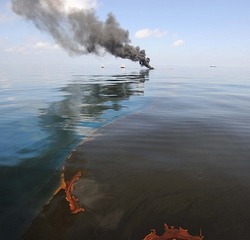Spills and Spin: Is the BP oil disaster just like a 'plane crash'?
 With public support for offshore oil drilling slipping and Washington pushing for new regulations on the industry, what's a pro-drilling politician, pundit or lobbyist to do?
With public support for offshore oil drilling slipping and Washington pushing for new regulations on the industry, what's a pro-drilling politician, pundit or lobbyist to do?Apparently, something like this: Minimize the Gulf oil disaster, compare it to a freak accident, and suggest that drilling for oil 5,000 beneath the ocean is just as essential to our daily lives as, say, flying in an airplane.
The meme started at the political fringes: The earliest example I can find came from none other than Michael Brown, Bush's infamous FEMA director during Hurricane Katrina, who said this during a May 4 appearance on Fox News:
When this occurred in the gulf, there's no doubt in my mind that [environmentalists] saw it as an opportunity to say, 'This is a dangerous industry, a bad industry, and we ought to limit it to the extent we can' -- and he shut down the existing drilling offshore, or at least suspended it, which is a huge overreaction. I venture to say there will be a car wreck in Denver today, but we don't shut down driving. And there may be a plane crash somewhere, but we don't shut down the airlines.But the airplane analogy soon seeped into the words of pro-drilling newspaper columnists and pundits. On May 11, a USA Today editorial ended with this:
Just as one plane crash doesn't mean that the nation should stop building jetliners and airports, one horrific spill can't be allowed to dictate energy policy for decades.The Washington Times on May 11:
People don't stop flying after an airplane crash. The U.S. should not withdraw from oil production offshore because of one major leak.David Brooks followed with this in a May 26 back-and-forth in the New York Times:
The crude reality is that life involves risk. Sometimes airplanes crash and hundreds of people die. Sometimes coal mines collapse. Sometimes oil drilling technology goes kablooie. We should regulate these industries to maximize safety while still allowing them to be viable. After an accident or a crash, blame, if there is any, should be assigned and the company should pay damages. But I don't really understand why an oil spill brings out a torrent of rage when a plane crash, say, brings out much less.It was just a matter of time before politicians and industry lobbyists jumped on the life-is-dangerous/oil-rigs-are-just-like-airplanes message train. On May 26, Sen. Alexander (R) of Tennessee said this to MSNBC:
We can't stop flying just because we have a terrible airplane crash, but we can do everything we can to make sure we don't have another one.Sen. David Vitter (R) of Louisiana soon followed on CNN May 30:
By the same token, after every plane crash, you and I should both oppose plane travel. I don't think that is rational.There was also embattled South Carolina Republican gubernatorial candidate (and Tea Party favorite) Rep. Nikki Haley, who intoned during a debate that after plane crashes "We don't stop all the planes from flying ... That's the same thing here."
The last to follow were flacks for the energy industry, careful about appearing insensitive but perhaps finally realizing a good talking point when they found one. Here's Bruce Vincent of the Independent Petroleum Institute of America in today's New York Times:
It's amazing to see the impact that one company can have for all sorts of other people, When a plane crashes, you don't just shut down every airline in the fleet until you find out what happened.It seems the pro-drilling forces are on the same page. But does the oil drilling/airplane analogy hold up?
It is true, as Brooks says, that there are lots of dangerous industries, and it's hard to find any source of energy that doesn't entail some risk. But those loose similarities gives way to more obvious differences:
* ESSENTIAL VS. NON-ESSENTIAL TECHNOLOGY: The implication of the airplane/offshore drilling analogy is that both are so essential to our economy that we wouldn't possibly want them to stop. That may be true of airplanes: 40 to 50 million passengers board airplanes every month in the U.S., and they'd want a very good reason for grounding all flights. But given alternatives like clean energy, conservation and raising fuel efficiency standards, does it make sense to put offshore drilling on the same level?
* RELIABLE VS. UNTESTED OPTIONS: Unlike jet airplanes, which have been in production since 1939, deep water oil rigs similar to the ill-fated Deepwater Horizon only appeared in the scene in the late 1990s. In fact, many of the problems with containing the BP spill have been a result of the inherent and untested challenges of drilling in harsh deep water locations. The oil majors pushed for deep water exploration when gases prices were high earlier this decade, but industry and government didn't keep pace in assessing the risks.
* CONSUMER CHOICE: Free market advocates should get this distinction: When consumers choose how to travel, they can decide whether to opt for flying, driving or riding a train. But since federal policy allows all oil companies to drill offshore, consumers don't have any choice at the pump between gas that's been drilled offshore or on land.
And, given that the BP oil spill is widely being called the biggest environmental disaster in our country's history -- and that the oil may well keep gushing into the ocean until August -- the scope and lasting impact of this disaster seem to put it on a different scale entirely.
But such realities rarely get in the way of a good political talking point.
Tags
Chris Kromm
Chris Kromm is executive director of the Institute for Southern Studies and publisher of the Institute's online magazine, Facing South.
